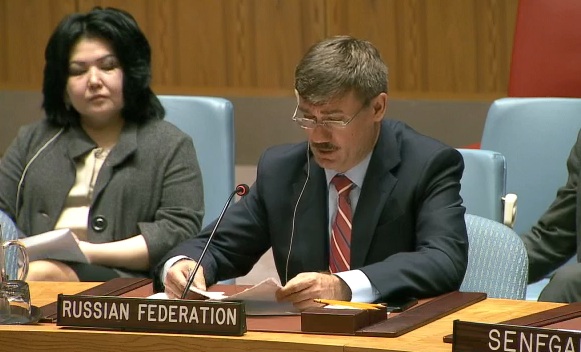Statement by Mr. Petr Iliichev, Chargé d'Affaires, at the Security Council on the question concerning Haiti
We express our condolences to our Egyptian colleagues in connection with the terrorist attack on 9 April. The masterminds of these attacks demonstrated both their lack of humanity and cruelty in carrying them out. We support the measures that are being undertaken by the Government of Egypt in its unrelenting fight against terrorism. We express our condolences to the bereaved families and hope that the injured will recover as quickly as possible.
We thank the Special Representative of the Secretary-General, Ms. Honoré, for her briefing on the results of the strategic review of the United Nations Stabilization Mission in Haiti (MINUSTAH) and on the situation in the country. We are pleased to note the conclusion of the long electoral process, with the conduct in November of last year of the presidential elections and then in January of this year the parliamentary elections, which clearly served to ease social and political unrest in the country.
We welcome the intention of the new Government of Haiti to strengthen national unity, peace and democratic order as well as its demonstrated readiness to engage in constructive dialogue with a wide variety of political forces to resolve problems of import for the whole country. One of the key items on the Haiti agenda is shoring up the system of governance at all levels in the interest of overcoming still highly relevant social and economic problems and ensuring long-term stability. In this regard, we consider the approval by the National Assembly of the newly-formed Government as a positive step towards establishing a viable and effective chain of executive power, which will ensure the reformation planned for by the Government of Haiti.
With respect to international support, we note the recommendation of the Secretary-General to extend the mandate of the United Nations mission for the next sixmonth period and its gradual drawdown of the military component, which is fully staffed at present. We see a reason to reconfigure MINUSTAH according to the new situation, but that has to be done in the most cautious manner. It is important to prevent a security void. It would be unacceptable to repeat the negative experience of the drawdown of the predecessor mission in 2000. More generally speaking, we would like to call attention to the following rather important aspect.
In spite of the fact that the relevant recommendations of the Secretary-General reflect the positive trends on the ground, we are convinced that the situation remains quite tenuous. The Haitian Government and Haitian society have a number of daunting tasks to fulfil and which need to be urgently resolved. I do not think that we could call the post-conflict stage a simple one.
As has many times been stated in this Chamber, including at the Security Council meeting with the Secretary-General on 6 April (S/PV.7918), which is the most recent example, increasing the effectiveness of how peacekeepers carry out their mandates means that the mandates have to be well defined, clear and realistic. We are guided by the idea that the SecretaryGeneral’s proposed new mission in Haiti will continue to act under Chapter VII of the United Nations Charter. However, the provisions of this Chapter must be applied only with respect to those tasks where it is absolutely necessary. I am referring first and foremost to security and the maintenance of law and order.
For its part, in the framework of international efforts, Russia will continue to make its contribution to undertaking a host of tasks to ensure stability and security, with a view to rebuilding the country in line with MINUSTAH’s mandate.
